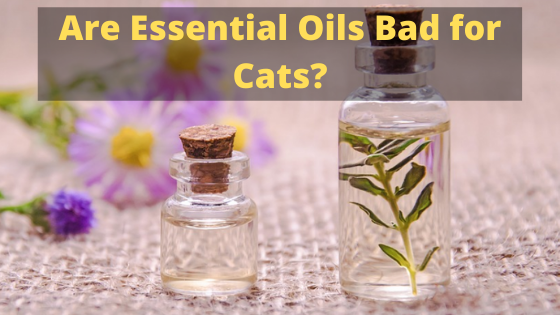Essential oils are a sensitive subject in the animal world.
For large dogs, for example, they are not really a problem and can be used on a regular basis.
For smaller animals like cats, things get more complicated and they should be used sparingly.
Cats are one of these animals, so avoid throwing any oil on their skin, you might hurt them more than anything else.
Here are a few tips that will help you during your errands and your special moments with your feline.
What Is an Essential Oil?
Essential oils are volatile organic constituents of plants that contribute to fragrance and taste. They are extracted from plants by distillation or cold pressing.
Essential oils are used in various ways: as insecticides, in aromatherapy, personal care products (e.g. antibacterial), aromas, herbal remedies and liquid potpourri.
Toxic Essential Oils for your Cat
It is important to start by listing the oils that are absolutely to be avoided. The mere smell of an oil can hurt your pet.
Cats have much more developed senses than ours, so their noses are more sensitive and more easily attacked by powerful scents. A product that can smell good for you can be a real torture for your cat.
If you end up using scented products, it is vital to keep a place that is not affected by them, so your cat can take refuge there when it is overwhelmed by the odors.
Here are the oils to avoid when you have a cat:
- Cinnamon
- Clove
- Thyme
- Oregano
- Pine
- Cajeput
- Lemon
- Orange
- Lime
- Grapefruit
- Savory
- Bergamot
- Tangerine
- Neroli
- Cypress
- Fir
- Juniper
- Birch
- TeaTree
- Spruce
- Almond
- Boldo
- Garlic
- Peppermint
- Camphor
- Calamus
- Mustard
- Horseradish
- Cassia
- Chenopodium
- Tansy
- Sassafras
The Right Essential Oils for your Beloved Kitty
When you do your shopping, avoid as much as possible synthetic oils, which are very close to perfumes.
You should as much as possible go for 100% pure oils, the quality will be much higher, and the risks of hurting your pet will be reduced as much as possible.
A real essential oil is extracted from living plants and maintains a real relationship with Nature, the others are more on the chemical and diluted side.
You will be able to dilute them yourself later, without altering the quality.
Less aggressive oils are called “hydrosols” and can be used in combination.
Here are some essential oils for your cat:
- Lavender (Lavandula spp.), Damask rose (Rosa damascena), strong smelling pelargonium (Pelargonium graveolens) and Bigaradier (Citrus aurantium) are very good for calming the nerves of the animal.
- Calendula officinalis (Calendula officinalis) is exceptional for your cat’s comfort.
- Sweet pea (Lathyrus odoratus) and yarrow (Achillea millefolium) are good for energizing your feline.
- Large-flowered jasmine (Jasminum grandiflorum) helps to fight depression.
How to Use Essential Oils on your Cat?
Cats can benefit from essential oils, however, do not apply them directly to your feline’s skin, as this could make him sick and confuse him for many days. This is why it is a good idea to opt for “hydrosols”.
These are alcohol-free preparations that come in liquid form.
They are essential oils diluted in such a way as to keep their therapeutic values.
They are safe products that can be applied around the cat’s environment, but still not directly on his skin or fur!
Also keep a room free of odors so that he can take refuge there.
You can even find these hydrosols in some specialized stores, already prepared especially for cats.
Of course, you must keep all your oils and hydrosols out of your pet’s reach, and prevent them from drinking, licking or adding them to their food.
Are Essential Oils Bad for Cats?
One might think that oils are toxic and unusable. However, they can be useful in case of injury or illness.
However, cats are smaller and more sensitive animals than some mammals. They lack the enzyme glucuronyl transferase in their body.
They cannot then eliminate phenols and other natural toxins contained in certain plants, which are harmless to other mammals.
A human will eliminate these toxins through his urine, for example. The cat won’t even be able to do so.
This is why you have to be very careful with oils, if the cat is touched by a few drops, he could become very sick.
Hydrosols are for the moment the only safe solution, pending further scientific studies. The higher the concentration of the essential oil (i.e. 100%), the greater the risk for the cat.
The symptoms that develop depend on the type of oil involved in the exposure and can include drooling, vomiting, trembling, ataxia (shaking), respiratory distress, low heart rate, low body temperature and liver failure. This can therefore become a real danger for the cat.
Aromatherapy and Cats
If you have any doubts about the use of essential oils on your cat or other animals, the best thing to do is to go see a naturopathic doctor specialized in aromatherapy. This person will be in the best position to help your cat and take care of it.
A word of warning, however: choose your aromatherapy professional carefully, so as not to come across a quack-doctor.
Just like oil and water, essential oils and cats really don’t mix. Owners should be careful when using essential oils and diffusers in their home to protect their cat from a toxic risk.
Most importantly, concentrated essential oils should never be applied directly to cats, unless otherwise advised by a specialist.
Author Bio:
I am a 24 year old girl from Scotland. I have been living with cats since my early childhood. In short, I am a real cat freak, to the point of having dedicated a blog to my best companions: https://catlicking.com

